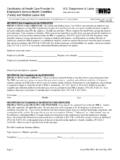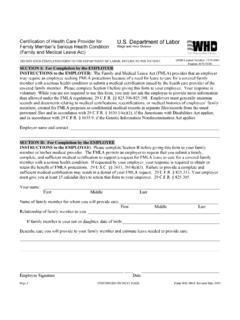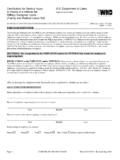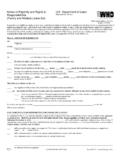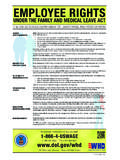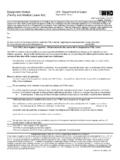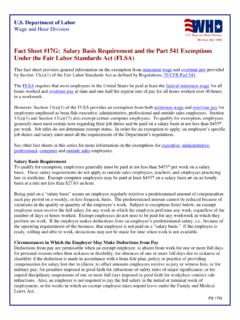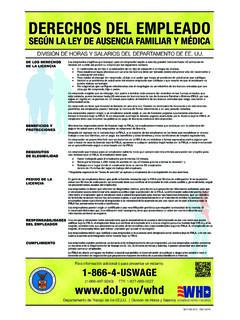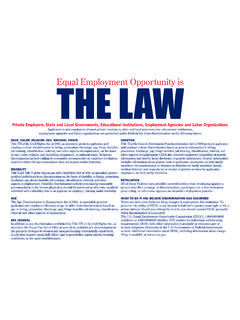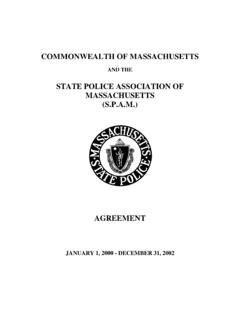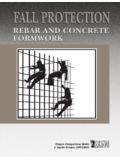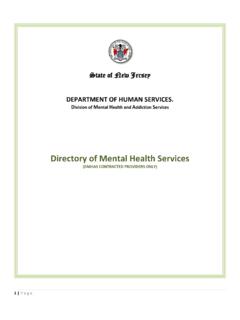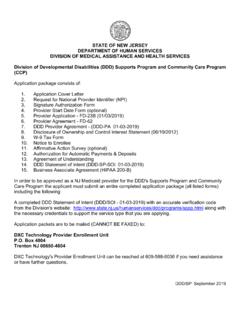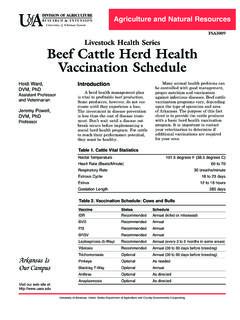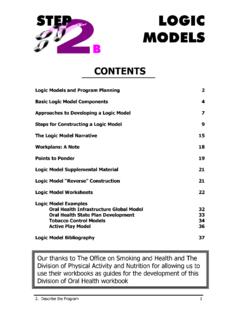Transcription of Fact Sheet #53 – The Health Care Industry and Hours Worked
1 Department of Labor Wage and Hour division (Revised July 2009) fact Sheet #53 The Health care Industry and Hours Worked The Fair Labor Standards Act (FLSA) requires covered employers to pay non exempt employees at least the federal minimum wage of $ per hour effective July 24, 2009, for all Hours Worked and overtime pay forfor Hours Worked over 40 in a workweek. The FLSA is administered by the Wage and Hour division of the Department of Labor. Hospitals and other institutions primarily engaged in the care of the sick, the aged, or the mentally ill are covered employers under Section 3(s)(1)(B) of the FLSA.
2 Thus, hospitals, residential care establishments, skilled nursing facilities, nursing facilities, assisted living facilities, residential care facilities and intermediate care facilities for mental retardation and developmentally disabled must comply with the minimum wage, overtime and youth employment requirements of the FLSA. Summary This fact Sheet provides guidance regarding common FLSA violations found by the Wage and Hour division during investigations in the Health care Industry relating to the failure to pay employees for all Hours Worked . Nonexempt employees must be paid for all Hours Worked in a workweek. In general, Hours Worked includes all time an employee must be on duty, on the employer premises, or at any other prescribed place of work.
3 Also included is any additional time the employee is suffered or permitted to work. The FLSA requires employers to pay for Hours actually Worked , but there is no requirement for payment of holidays, vacation, sick or personal time. The failure to properly count and pay for all Hours that an employee works may result in a minimum wage violation if the employee s hourly rate falls below the required federal minimum wage when his or her total compensation is divided by all Hours Worked . More likely, the failure to count all Hours Worked will result in an overtime violation because employers have not fully accounted for Hours Worked in excess of 40 during the workweek. Rounding Hours Worked Some employers track employee Hours Worked in 15 minute increments, and the FLSA allows an employer to round employee time to the nearest quarter hour.
4 However, an employer may violate the FLSA minimum wage and overtime pay requirements if the employer always rounds down. Employee time from 1 to 7 minutes may be rounded down, and thus not counted as Hours Worked , but employee time from 8 to 14 minutes must be rounded up and counted as a quarter hour of work time. See Regulations 29 CFR (b). Example #1: An intermediate care facility docks employees by a full quarter hour (15 minutes) when they start work more than seven minutes after the start of their scheduled shift. Does this practice comply with the FLSA requirements? Yes, as long as the employees time is rounded up a full quarter hour when the employee starts working from 8 to 14 minutes before their shift or if the employee works from 8 to 14 minutes beyond the scheduled end of their shift.
5 Example #2: An employee s schedule is 7 to 3:30 with a thirty minute unpaid lunch break. The employee receives overtime compensation after 40 Hours in a workweek. The employee clocks in 10 minutes early every day and clocks out 7 minutes late each day. The employer follows the standard rounding rules. Is the employee entitled to overtime compensation? Yes. If the employer rounds back a quarter hour each morning to 6:45 and rounds back each evening to 3:30 , the employee will show a total of Hours Worked during that workweek. The employee will be entitled to additional overtime compensation for the Hours over 40. Example #3: An employer only records and pays for time if employees work in full 15 minute increments.
6 An employee paid $10 per hour is scheduled to work 8 Hours a day Monday through Friday, for a total of 40 Hours a week. The employee always clocks out 12 minutes after the end of her shift. The employee is paid $400 per week. Does this comply with the FLSA? No, the employer has violated the overtime requirements. The employee Worked an hour each week (12 minutes times 5) that was not compensated. The employer has not violated the minimum wage requirement because the employee was paid $ per hour ($400 divided by 41 Hours ). However, the employer owes the employee for one hour of overtime each week. Travel Time Time spent by an employee in travel as part of his principal activity, such as travel from jobsite to jobsite during the workday, must be considered as Hours Worked .
7 An employee who travels from home before the regular workday and returns home at the end of the workday is engaged in ordinary home-to-work travel. This is not considered Hours Worked . See Regulations 29 CFR Example #4: A licensed practical nurse (LPN) works at an assisted living facility which has a sister facility 20 miles away. There have been times that the LPN has been asked to fill in for someone at the other facility after she completes her shift at her normal work site. It takes her 30 minutes to drive to the other facility. The travel time is not recorded on her time Sheet . Is this a violation of the FLSA? Yes. The travel time must be considered part of the Hours Worked . Training and Seminars Attendance at lectures, meetings, training programs and similar activities are viewed as working time unless all of the following criteria are met: Attendance is outside of the employee s regular working Hours ; Attendance is in fact voluntary; The course, lecture, or meeting is not directly related to the employee s job; and The employee does not perform any productive work during such attendance.
8 See Regulations 29 CFR Example #5: A residential care facility offers specialized training on caring for Alzheimer residents. There are two workshops: one in the evening for the day shift and one during the day for the evening shift. All employees are required to attend. Is this compensable time? Yes, because the training is not voluntary and is related to the employees jobs. Example #6: The administrator of a nursing home says specialized patient care training is voluntary, but the nursing supervisors expect all employees on their units to attend and schedule times for each employee to go. Is the time considered Hours Worked ? Yes, the time would be considered Hours Worked . When the nursing supervisors expect all unit employees to attend and schedule their times, it is not truly voluntary.
9 Example #7: The dishwasher decides to go to the Alzheimer s training session after his shift. Must the administrator pay for the dishwasher s time spent at the training session? No, because all four criteria above are met. It is not considered Hours Worked . Example #8: The administrator provides a Tai Chi course to residents and allows employees to attend during their off-duty Hours . Do employees have to be paid for the time they attend this course? No, the employees do not have to be paid because attendance is voluntary and the other three criteria are met. Meal Breaks Bona-fide meal periods (typically 30 minutes or more) are not work time, and an employer does not have to pay for them.
10 However, the employees must be completely relieved from duty. When choosing to automatically deduct 30-minutes per shift, the employer must ensure that the employees are receiving the full meal break. See Regulations 29 CFR Example #9: A skilled nursing facility automatically deducts one-half hour for meal breaks each shift. Upon hiring, the employer notifies employees of the policy and of their responsibility to take a meal break. Does this practice comply with the FLSA? Yes, but the employer is still responsible for ensuring that the employees take the 30-minute meal break without interruption. Example #10: An hourly paid registered nurse works at a nursing home which allows a 30-minute meal break.
